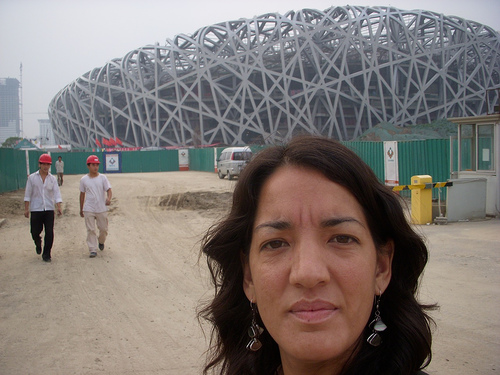There’s been so much hype and excitement about it. I just had to come see the The Olympic Stadium (nicknamed the Bird’s Nest) for myself. It’s enormous and obviously meant to inspire awe and reverence in Chinese and foreigners alike, regardless of the cost (which at this point is estimated at 3.8 billion Yuan – or $500 million US). Of course, the construction is still going on…

The Chinese government’s obsession with audacious mega-projects is nothing new, with each serving different military and economic purposes. (Three Gorges Dam, Tibet Railway). There is a common, psychological theme running through all of these projects including the Bird’s Nest: all of them are meant to communicate China’s technological progress and prowess. However, these project’s architectural scale and engineering sophistication cannot gloss over the absence of the two most basic rights of China’s people: freedom and democracy.Will freedom and democracy ever come to China? Does economic progress automatically lead to an opening up of restrictive, repressive political systems, as so many academics and China apologists claim? In fact, as China’s economy gets more advanced, the tools of repression and fear also seem to become more sophisticated.
Here’s a short video I shot to give you a sense of the construction and space around the site:
As a Tibetan born and raised in exile, I have come to cherish the freedom I enjoy outside of my own homeland. Freedom is addictive, and once you taste it, you’re hooked; you only want more. There was a time when my grandparents lived in a free Tibet and led free lives. Mine is an unfortunate generation of Tibetans, either wandering in foreign lands or living under oppression in our homeland.
As I write this, there are 14 Tibetans sitting on the street in Delhi who are entering their 27th day of Hunger Strike. They hunger for freedom more than they hunger for food. They have vowed to die in the face of oppression rather than resort to violence. My thoughts and prayers are with them.
And even though the feeling of repression hangs over this place like smog, I also feel strongly that change is at hand, not only for Tibet but also for China. The charade has gone on long enough. As I turned back for one last photograph of the Bird Nest, it suddenly looked almost toy-like.
An old Chinese proverb quotes a scholar who said:
When man fights nature
Nature kills man.
The sky turns black
And empires crumble.
Well, the sky here is nearly black.
“And this is the country that claims to develop Tibet for the better?” I said to myself, as I imagined the vast, blue, blue, blue sky of my homeland Tibet.


What Chinese did to their homeland in terms of environment degradation they will surely do much worst to Tibet sooner or later. Lhadon la you set an exemplary move which will inspire Tibetans and everyone else to continue this endeavor through proactive action until we regain our inalienable rights of a Free Tibet and a truly democratic China.
-Dawoe
One of the basic theories of sociology is that if a groups technology changes, so does the way they think and relate to each other. I agree with you Lhadon that a change is at hand in China. SFT has rekindled the passion so many Tibetans have for our country and its people. Specially the younger generation who are the future of Tibets freedom. Kudos to you and ure friend and I wish you both a safe journey back.
Well done Lhadon la and your friend. Please take care, we need person like you for our struggle
My prayes and lots of love
chungdak